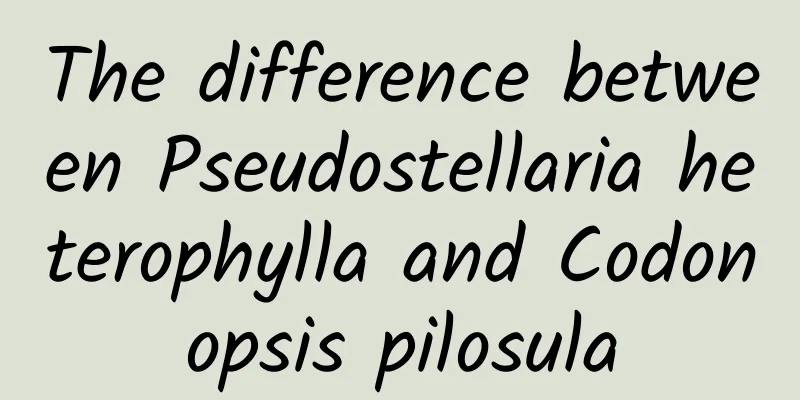The efficacy and function of stinking ivy

|
The nutritional value of stinking ivy is rich and the medicinal value is also high. Let us introduce in detail the effects and functions of the traditional Chinese medicine stinking ivy. [Source] Medicinal material source: It is the stem of Cocculus orbiculatus (L.) DC.var.mollis (Wall.exHook.F.etThoms) Hara, a plant of the Menispermaceae family. [Original form] 1. A woody vine of Stephania tetrandra. Young branches are densely covered with soft hairs, old branches are almost hairless, and the surface has straight lines. Simple leaves are alternate; petioles are 1-3cm long and covered with white soft hairs; leaf blades are papery to nearly leathery, with great variation in shape, linear-lanceolate to broadly ovate-near circular, narrowly elliptic to nearly circular, oblanceolate to obcordate, sometimes ovate-cordate, 3-8cm long, a few exceeding 10cm, 1.5-5cm wide, apex acuminate, acute or obtuse with a small convex tip, sometimes slightly emarginate or 2-lobed, base cuneate, rounded or cordate, margin entire or 3-lobed, sometimes palmately 5-lobed, densely to sparsely pubescent on both sides, sometimes nearly glabrous on both sides. Cymes solitary or arranged in panicles, axillary or terminal, up to 10 cm or longer, pubescent; flowers unisexual, dioecious; male flowers: pale yellow; sepals 6, glabrous, outer whorl ovate or elliptic-ovate, 1-2 mm long, inner whorl broadly elliptic, up to 2.5 mm long; petals 6, oblanceolate-round, 2-lobed at apex, with ears on both sides of base, and folded inward, 1-2 mm long; stamens 6, shorter than petals; female flowers: sepals and petals similar to male flowers; 6 staminodes, tiny; 6 carpels. The drupe is nearly spherical, purple-red or blue-black when ripe, and 7-8mm long. The flowering period is from May to August, and the fruiting period is from August to October. [Habitat distribution] Ecological environment: 1. Growing on hillsides, thickets, forest edges, roadsides or sparse woods. 【Nature and flavor】 Bitter; Cold 【Functions and indications】Diuresis and detumescence; dispelling wind; detoxification. Mainly used for edema; painful urination; rheumatic bone pain; carbuncle and swelling [Usage and Dosage] For oral use: decoction, 5-10g. 【Excerpt】 Chinese Materia Medica The above is a detailed analysis of stinking ivy. Now that everyone has learned about the various effects of stinking ivy, they must remember these effects so that when they encounter these problems, they can use the magical effects of stinking ivy to restore their health and happiness. |
<<: The efficacy and function of guava peel
>>: The efficacy and function of dryland grass
Recommend
Technology News丨Omicron strain becomes a "serious threat" to the UK; Japanese wholesalers sell Chinese eels as Japanese-made
【Today’s cover】 On December 18, the winter scener...
The efficacy and function of primrose root
Traditional Chinese medicine requires the use of ...
In the competition for special drugs for COVID-19, which “players” stand out?
The new coronavirus pandemic is not over yet. In ...
Being frightened by "paranormal phenomena" while in hospital? There may be a scientific explanation
Hospitals are familiar places to most people, but...
Zhangye Binggou Danxia: Desolate and lonely beauty
Danxia is a red landform first discovered and nam...
Is spiciness a kind of pain? Why does it make people feel "painful and happy"?
In the world of food, there is a unique stimulati...
The efficacy and function of egg seven
Egg seven is a kind of traditional Chinese medici...
The efficacy and function of Yunnan red cardamom
Traditional Chinese medicine requires the use of ...
The efficacy and function of Litsea cubeba leaves
Litsea cubeba leaves are a commonly used medicina...
Can myopia be controlled while sleeping? Are the "myopia magic tool" OK glasses really OK?
“Can orthokeratology lenses really delay the prog...
Don't eat this fruit! "Mycotoxins" are no joke...
Many of us have had this experience: we bought a ...
Electric fan + mineral water bottle instantly turns into a "cooling artifact", is there any scientific basis for this?
Recently, a short video of "loading mineral ...
What kind of "heavenly dish" can be stationed in the space station?
The Wentian Laboratory is the first scientific ex...
Gene-edited insects: Small yet powerful
Produced by: Science Popularization China Author:...
What are the medicinal values of Aloe arborescens?
Arborescent Aloe is a herbaceous plant. Perhaps m...









